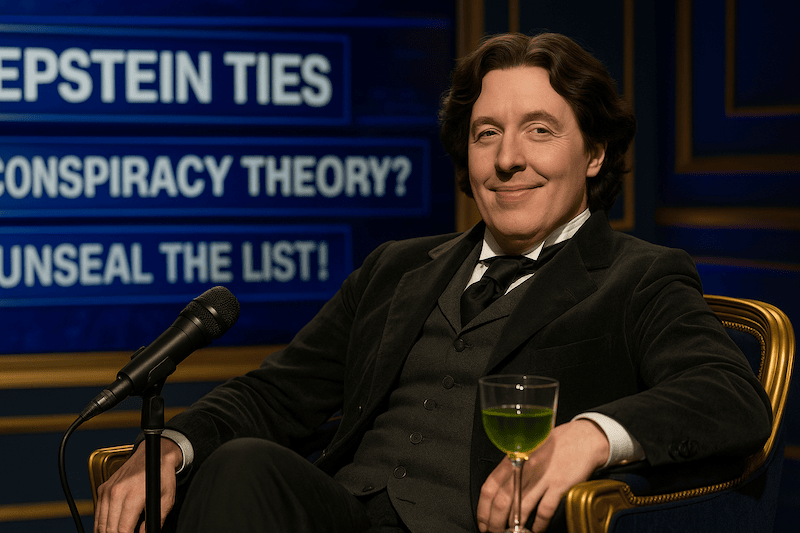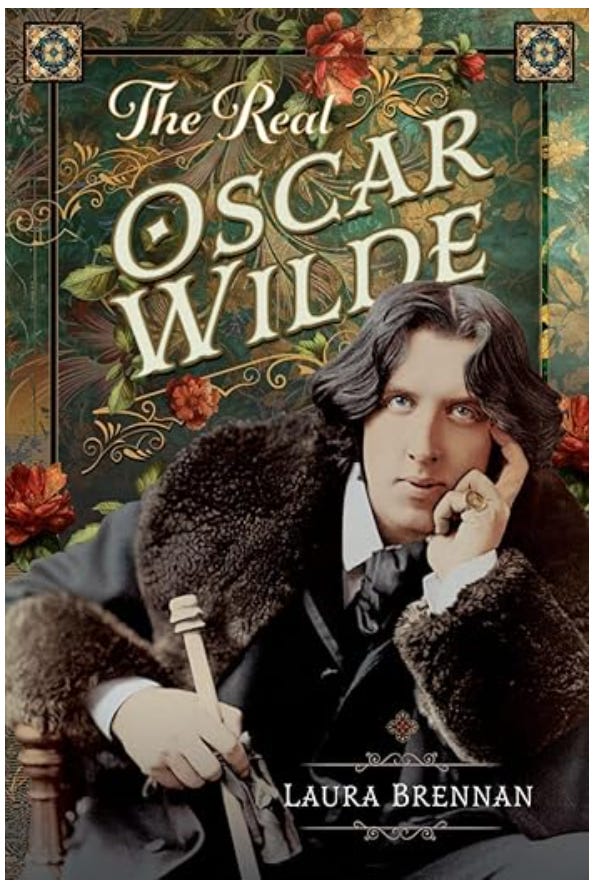Oscar Wilde on Epstein, Moral Outrage, and the Theatre of Modern Politics
A full-length ChronoTranscriptor™ interview — Oxford-London-Marb-a-Lago frequency
[Host Introduction]
On this episode of ChronoTalks, we summon none other than Oscar Wilde—Victorian playwright, scandal magnet, wit supreme. With outrage swirling around the Epstein case and certain political groups clinging to it like pearls at a séance, we asked Mr. Wilde to sit down and give us his unfiltered take.
Needless to say, he did so with champagne in hand and several sharpened verbal daggers.
[Interview Begins]
Host: Mr. Wilde, thank you for joining us. The Epstein case remains a flashpoint in political discourse, especially for those who identify with the MAGA movement. What do you make of this obsession?
Oscar Wilde: Obsession is the sincerest form of insecurity. When a movement becomes fixated on a scandal involving yachts, billionaires, and private islands, it’s rarely out of solidarity with the exploited—it’s usually because they weren’t invited.
Let me be clear: I do not mock concern for the victims. What I mock is the rather selective memory that accompanies this crusade.
You cannot build a temple of truth atop a landfill of self-delusion.
Host: MAGA activists insist they’re only seeking justice—uncovering elite corruption.
Wilde: Ah, yes. That charming brand of justice which flares only when the accused attend the wrong fundraisers.
Their pursuit of truth is akin to a foxhunt hosted by the foxes—furious and loud, but never intending to catch anything they can’t stuff and display.
If they are truly concerned with elite corruption, might I suggest they start with their own campaign finance spreadsheets?
Host: Some argue the outrage is performative. Would you go that far?
Wilde: Darling, it’s not just performative—it’s community theatre with a budget.
We live in an era where every scandal is a Netflix pitch, and every moral panic is a marketing strategy. These people don’t seek justice; they seek engagement metrics.
They say “Where’s the client list?” not out of civic duty—but because they know it drives clicks, donations, and meme fodder.
And when it turns out one of their own was on the list? Suddenly, we pivot to “due process.”
Host: Shouldn’t we still encourage public pressure to release the Epstein files?
Wilde: Certainly—but pressure driven by principle, not performance.
Demanding justice only when it flatters your enemies is not righteousness. It’s political cosplay.
I say: by all means, unseal the files. Let the rot breathe. But don’t stop there. Investigate everyone. Left, right, royal, retired, rebranded. No exceptions. No red hats or blue shields.
Otherwise, we’re not running a democracy—we’re curating a reality show.
Host: MAGA leaders say this is “proof” that elites can get away with anything.
Wilde: Oh, how touching—contempt for elites from men who list "elite status" as a donor perk.
Let us not confuse envy with moral clarity. When the outrage comes from a gold-plated podium, I find it hard to take seriously. The irony is positively blinding.
It is not “elites” they detest. It is uncontrolled elites. Those who make their money through unfamiliar rituals—be it tech or art or global diplomacy—rather than real estate and golf tournaments.
Host: Many conservatives argue Epstein’s circle proves liberal corruption.
Wilde: Corruption is not an ideology. It is a currency. And it is happily accepted in red and blue.
It is always amusing to watch one group point at the other and shout “Degenerate!” while holding their own scandals in a monogrammed clutch.
Host: If you were alive today, what would you say to MAGA-aligned figures demanding “answers” about Epstein?
Wilde (pausing): I would say, “How noble of you to seek truth, so long as it doesn’t visit Mar-a-Lago unannounced.”
Host: Some say focusing on Epstein distracts from real policy debate.
Wilde: Precisely. It’s much easier to rage at the ghosts of Epstein than to propose, say, healthcare reform.
Moral outrage is the currency of the lazy politician. It costs nothing, and buys votes.
I’ve always believed that people are more comfortable talking about corruption when it’s cloaked in scandal and salaciousness. No one ever chants, “Audit the Cayman Accounts!”—but say “Unseal the list” and suddenly you're a hero.
Host: So you believe this obsession will fade?
Wilde: No. It will mutate.
Scandals are no longer events. They are brands. Epstein is not a man anymore—he is a franchise.
They will reboot him, sequel him, and merchandise him until justice is irrelevant and the T-shirts outsell the truth.
Host: Is there any hope?
Wilde: Of course. But it requires the courage to look inward.
Justice cannot be partisan. Outrage must not be for hire. And moral consistency must survive contact with one’s own reflection.
Until then, I recommend the only honest response to hypocrisy: satire, exposure, and a strong cocktail.
[Closing]
Oscar Wilde reminds us that while justice is a noble pursuit, it often travels in the company of vanity and self-interest.
His words sting not because they’re cruel—but because they are painfully accurate.
Next time on ChronoTalks, we bring back Ida B. Wells to explore media silence in high-profile abuse cases—and how truth finds its voice, even when the world looks away.
Until then—stay sharp, stay skeptical, and avoid the cheap seats in the theatre of outrage.
Born in 1854 to overachieving parents during the conservative and bourgeois Victorian era, Oscar Fingal O’Flahertie Wills Wilde would go on to become one of Ireland’s most celebrated poets and playwrights.
The shaping of the real Oscar Wilde was deeply influenced by his formative years, education, and life experiences. Yet, he remained a man in constant evolution—a poet, aesthete, playwright, political thinker, essayist, husband, father, lover, and eventually, a prisoner. Complex and often contradictory, Wilde was, in many respects, far ahead of his time.
His professional triumphs—including The Picture of Dorian Gray, The Importance of Being Earnest, and A Woman of No Importance—are among the most quoted literary works in modern times.
However, it is Wilde’s personal life and the scandal that erupted in 1895 that often dominate public memory. Shortly after the birth of his second son, Wilde began to explore his sexuality. This newfound personal freedom led to his fateful relationship with Lord Alfred “Bosie” Douglas. At the height of his fame, Wilde’s world—and the lives of his wife and children—was upended by a libel suit that escalated into criminal charges and ultimately, imprisonment.
His years in prison and his life afterward were marked by physical and emotional suffering, isolation, and tragedy—factors that contributed to his death in 1900. Yet the real Oscar Wilde endures: in his enduring body of work, in the legacy of his sons Cyril and Vyvyan, and in the lasting relevance of his story to the modern LGBTQ+ community well into the twenty-first century. More information…




